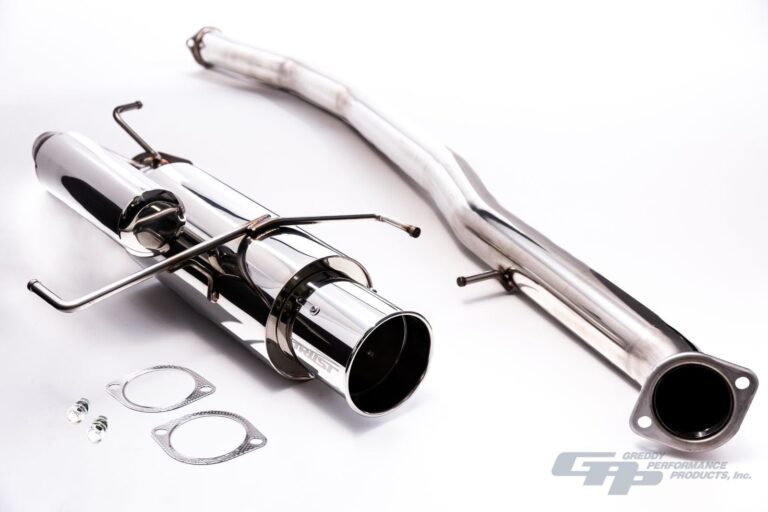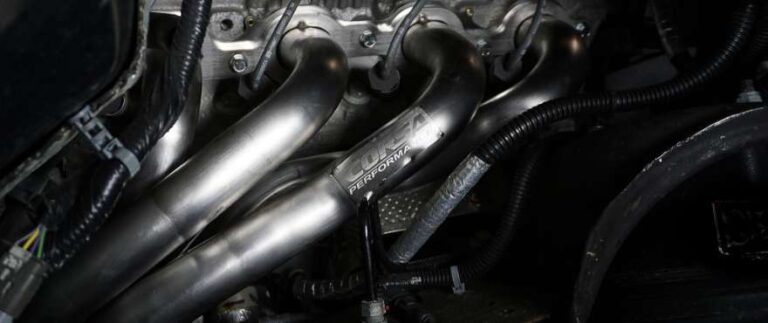Exhaust Leak Noise : Uncover the Hidden Sounds and Solutions
Exhaust leak noise can indicate an issue with the exhaust system, causing a loud, hissing or roaring sound. When the exhaust gases escape from a damaged or loose component, such as a manifold or pipe, it creates an audible disturbance.
A failing gasket or cracked exhaust manifold can also result in an exhaust leak noise. If left unchecked, this can lead to reduced engine performance and increased emissions. Therefore, it is essential to address any exhaust leaks promptly to maintain the efficiency and functionality of your vehicle’s exhaust system.
It is advisable to have a professional inspect and repair the exhaust system if you suspect an exhaust leak noise.
Identifying The Culprit: Signs And Symptoms Of Exhaust Leaks
Identifying the Culprit: Signs and Symptoms of Exhaust Leaks
Exhaust leaks can cause annoying noises, decrease engine performance, and even pose health risks. Recognizing the signs of an exhaust leak is crucial to maintaining your vehicle’s longevity and your own well-being.
Here are a few common indicators that can help you identify an exhaust leak:
| Noise: | An audible hissing, popping, or ticking noise coming from the engine or exhaust system could be a sign of an exhaust leak. |
| Smell: | A noticeable smell of gasoline or sulfur emanating from your vehicle’s exhaust could indicate a leak. |
| Decreased Fuel Efficiency: | Experiencing a sudden drop in fuel efficiency could be a result of an exhaust leak. |
| Check Engine Light: | If your vehicle’s check engine light is illuminated, it could be signaling an exhaust leak. |
| Visible Damage: | Inspecting your exhaust system for any visible cracks, holes, or loose connections can help identify a leak. |
Understanding these common signs and symptoms of exhaust leaks is essential to addressing the issue promptly. If you suspect an exhaust leak, it is recommended to consult a professional mechanic for a thorough inspection and necessary repairs.
Exploring The Hidden Sounds: Types Of Exhaust Leak Noises
Exhaust leak noises can be quite perplexing, as they come in various forms depending on the type of leak. If you hear a hissing sound, it may indicate a leaky gasket in your exhaust system. This could be due to a damaged or worn-out gasket, causing gases to escape and creating the distinct hiss. On the other hand, if you notice a rumbling or roaring noise, it likely suggests cracks or holes in your exhaust system. This can occur over time due to corrosion or physical damage. Additionally, a popping or backfiring sound may indicate a leaky exhaust manifold. When the manifold has a crack or a loose connection, it can cause the exhaust gases to escape and result in the popping noise. It’s essential to address these noise issues promptly to avoid further damage and ensure optimal performance of your vehicle.
Performance Implications: How Exhaust Leaks Affect Your Vehicle
An exhaust leak in your vehicle can have significant performance implications, affecting both power and acceleration. When exhaust gases escape before reaching the end of the exhaust system, the engine has to work harder to push them out, resulting in a loss of power. This can be especially noticeable during acceleration, as the engine struggles to generate the necessary force.
Furthermore, an exhaust leak can lead to increased fuel consumption. The uncontrolled release of exhaust gases means that the engine is not running as efficiently as it should be, causing it to burn more fuel to produce the same amount of power. This can result in decreased fuel economy, ultimately costing you more at the pump.
In addition to decreased performance and increased fuel consumption, an exhaust leak also poses the risk of potential engine damage. The escaping exhaust gases can cause excessive heat buildup, which can lead to harmful effects on engine components such as valves and cylinder heads. It is crucial to address any exhaust leaks promptly to prevent further damage to your vehicle’s engine.

Credit: www.amazon.com
Safety Concerns: The Dangers Of Unaddressed Exhaust Leaks
The accumulation of carbon monoxide gas due to unaddressed exhaust leaks can pose serious safety risks. Carbon monoxide is a colorless, odorless gas that can be fatal when inhaled in high concentrations. One of the major concerns associated with exhaust leaks is the increased likelihood of carbon monoxide poisoning.
Carbon monoxide can have detrimental effects on the respiratory system. When inhaled, it binds to hemoglobin in the blood, preventing oxygen from being efficiently transported throughout the body. This can lead to symptoms such as headaches, dizziness, nausea, confusion, and fatigue. Prolonged exposure to high levels of carbon monoxide can result in unconsciousness, brain damage, and even death.
It is essential to address exhaust leaks promptly to minimize the risks of carbon monoxide poisoning. Regular inspection and maintenance of the exhaust system are crucial to ensure its proper functioning and prevent the release of harmful gases into the vehicle cabin. Additionally, installing carbon monoxide detectors in enclosed spaces like garages can provide an extra layer of protection against potential leaks.
Repairing Exhaust Leaks: Diy And Professional Options
html| Repairing Exhaust Leaks: DIY and Professional Options |
|---|
|
Examining DIY repairs Exhaust leaks can cause a variety of problems, including excessive noise and reduced performance. If you suspect an exhaust leak in your vehicle, you may be considering making the repairs yourself. DIY repairs can be a viable option for those with some mechanical experience and the necessary tools. To start, you’ll need to locate the source of the leak by inspecting the exhaust system for any visible damage or loose connections. Once identified, you can attempt to patch or replace the damaged component. However, it’s important to note that DIY repairs may not always provide a long-lasting solution, and the risk of improper installation can lead to further issues. |
Preventative Measures: Maintaining A Leak-free Exhaust System
Regular inspections and maintenance are key to preventing exhaust leaks and maintaining a leak-free exhaust system. By conducting regular inspections, you can identify any potential issues early on and address them before they worsen.
During inspections, pay attention to any signs of wear and tear on your exhaust system components. Replacing worn-out components is crucial in preventing leaks. Look out for cracked or rusted pipes, loose clamps, and damaged gaskets, as these can all contribute to exhaust leaks.
Additionally, ensure that all connections are secure and properly tightened. This will help prevent any gaps or openings where exhaust gases can escape.
By implementing these preventative measures, you can minimize the risk of exhaust leak noise and keep your exhaust system functioning efficiently.
Frequently Asked Questions Of Exhaust Leak Noise
What Does An Exhaust Leak Sound Like?
An exhaust leak sounds like a loud hissing or popping noise coming from the engine, especially when accelerating or revving the car. It can also be accompanied by a noticeable decrease in engine power and a strong smell of exhaust fumes.
Is It Ok To Drive With An Exhaust Leak?
Driving with an exhaust leak is not recommended. It can release harmful gases inside your car, which can cause health hazards. Additionally, the leak can affect your vehicle’s performance and fuel efficiency. It’s best to have the exhaust system repaired by a professional to ensure your safety on the road.
How Can I Tell If My Exhaust Is Leaking?
To determine if your exhaust is leaking, look for signs such as loud noises, a sulfur-like smell, and reduced fuel efficiency. Check for visible damage or rust on the exhaust pipe, and listen for any hissing or popping sounds while the engine is running.
How Expensive Is It To Fix An Exhaust Leak?
Fixing an exhaust leak can vary in cost depending on the severity and type of repair. On average, it can cost between $100 to $500+. Factors such as the location of the leak and the make and model of the vehicle can also affect the price.
Conclusion
To summarize, an exhaust leak noise is not something to be ignored. It can indicate internal engine issues and compromise vehicle performance. Identifying and addressing this problem promptly is crucial to prevent further damage. Regular maintenance and inspections can help catch exhaust leaks early on.
If you notice any unusual noises, it’s best to consult a professional mechanic to diagnose and fix the issue. Keeping your vehicle in optimal condition ensures a smoother and safer driving experience.






